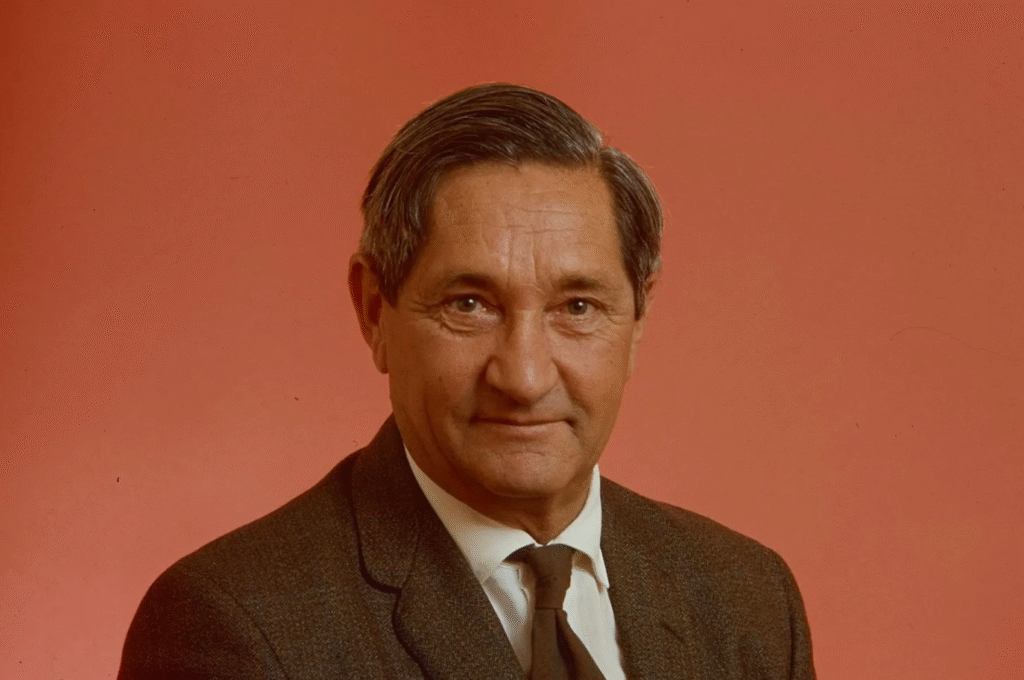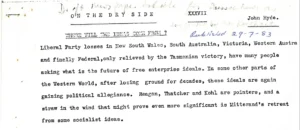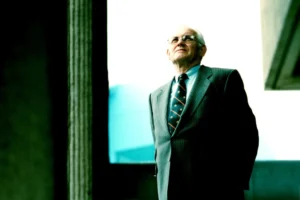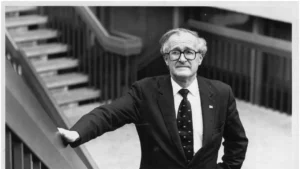The Modest Member
In a previous article in this series, I recalled the simple argument that the dries made and highlighted that it had a long history in Australian politics:
“Markets are rarely perfect,” John Hyde later wrote, “but neither are government interventions… Dries asked whether market failure or government failure presented the bigger problems in particular cases.”
When the main members of the dries – John Hyde, Peter Shack, and Jim Carlton – came together in the late 1970s, they made this simple argument. It was an old argument, based on an old idea which can be traced back through their predecessor in parliament Bert Kelly (1912-1997), through economists such as Shann, through George Reid (1845-1918) and Henry Parkes (1815-1896), all the way back to Adam Smith (1723-1790) who made similar arguments some 200 years previously.
The dries’s most immediate predecessor and inspiration in the federal parliament was C.R. ‘Bert’ Kelly, the member for Wakefield in South Australia between 1958 and 1977. Kelly’s final three years in the parliament were Hyde’s first three years, and served as a time to pass on the baton from one generation to the next. “I came under [Kelly’s] tutelage and became his fervent admirer and acolyte,” Hyde later wrote.
It was a baton that Kelly had received from the generation before him.
Bert Kelly was born in Riverton, South Australia, on 22 June 1912. His parents, William (1882-1969) and Ada, were farmers. The Kelly family had a history of combining farming with public service. William’s father, Robert Kelly (1845-1920), whose own father was a settler pioneer, was also a farmer and briefly served as a member of the South Australian parliament in the 1890s.
William’s public service was much more extensive, including serving on the federal government’s Tariff Board from 1929 to 1939. “Into this centre of fanatical belief in protection,” that is Melbourne where the Board was based, Bert Kelly later wrote, “my father suddenly appeared, straight from the farm and without any formal economic training, to try first to understand how tariffs worked (for good or ill) and then what action the Tariff Board should advise the government to take.”
William Kelly was the first great political mentor to his son. He passed along to Bert his belief that high tariffs would impose too great costs and distortions, and that free trade would be better in the long term. It was a belief he shared with the other great mentor in Bert Kelly’s life: Charles Hawker (1893-1938) who served as the member for Wakefield between 1929 and 1938.
“In my opinion an industry which requires more than 50% protection has little likelihood of ever becoming an asset to the country,” Hawker said in the House of Representatives in July 1930: “On the contrary, it is likely to place a heavy burden on other industries. Every cripple industry which is encouraged not only places an undue burden on the exporting industries, it also takes something from the common stock of resources which would otherwise be available to assist industries for which the country is suited.”
“Hawker read all the tariff reports carefully as they appeared,” William later wrote. “He hated unemployment as much as any man, but he knew extreme duties were dangerous and while it might add employment in occasional industries it would seriously add to costs and cause unemployment in many other areas… he knew that economic production was dependent very largely on the size of the market, and that it was unwise to give industry such huge protection that it would establish a cost structure and burden other industries.”
Together, William Kelly and Charles Hawker would help to shape the political philosophy that Bert Kelly took into his life of public service. They also helped with tactics, including where to find nuggets of useful information in Tariff Board reports.
Although his maiden speech to parliament, delivered in February 1959, focused on the balance of payments, Bert Kelly also set out his views on free trade, protectionism, and the burdens of government taxes and regulation in stifling economic opportunities and living standards:
I still feel that too many heads of industry are too busy sheltering behind the tariff wall, and I suggest to them that they climb up the wall now and have a look around. The wind of world competition might be keen, but it could also be invigorating. After all, the country thinks little of appealing to its farmers to do more, and, as a farmer, I say that surely secondary industry can meet world competition also…
We have the country, the climate and the ability. We are getting the knowledge, both scientific and technical. What we must have is the incentive to produce. We must be able to produce at a profit, and, to do this, we must be able to get our costs down… We are urged to cut out costs and a higher tariff is placed on the goods we buy; we are urged to cut out costs and the basic wage rises; we are urged to cut our costs and a sales tax of 16.5% is placed on motor trucks. We all know that we have to keep our costs down, but they are steadily rising…
We must make sure that we, as farmers, do all that we can, and I know as well as anyone how much better we as farmers can do. But the rest of you must do all that you can to ensure that you do not place an unnecessary load on our shoulders, because you must realise how heavy a responsibility we carry…
I believe that the free flow of world trade is the best hope we have of raising the standard of living all over the world… The whole world stands to gain from a freer flow of world trade, but Australia stands to gain more than most, with her export industries in particular.
Kelly is best remembered now for his (originally anonymous) Modest Member column, published each week between 1968 and 1980 in the Australian Financial Review. These columns were in addition to hundreds of other newspaper columns, books, and articles, along with countless speeches and interviews. His main focus was arguing against tariffs, subsidies, and other government restrictions to production and trade. He exposed the “fiscal illusion” that government spending does not really have to be paid for, and argued extensively against favours doled out to special interests and rent-seekers by politicians.
As Hal Colebatch wrote in his biography of Kelly, much of his writing “adopted the persona of a simple bush farmer, bewildered by the artifices of the city-slickers he was innocently exposing”.
On 4 December 1970, for example, the Modest Member’s column read:
Last week I reluctantly put a tentative toe in the hot tariff water. Since then I have found myself getting surprisingly interested in the subject. It won’t be long before I am a self-confessed expert.
One of the tariffs most bitterly resented by my farmers is that on motor vehicles. The average effective rate for these is 62 per cent.
As my farmers have to use cars and utilities, this protection, which increases the cost of their motor vehicles, is a grievous burden to bear, particularly now when their backs are almost bent double with other burdens.
And what makes them even madder is that they know that a lot of the protection for motor vehicles is to prevent Japanese cars competing with ours.
They know that Japan buys more of our wool than any other country and they think that this a funny way to encourage them.
And, as a last straw, they know that most of the companies that make cars are overseas owned, and repatriate their considerable profits.
So altogether they are not at all happy about paying over 50 per cent extra for their vehicles.
Fred [the Modest Member’s neighbouring farmer] says I ought to get off my tail and do something about it. So I took the whole knotty problem around to Eccles.
Eccles [the Modest Member’s economist friend] says the vehicle industry has three fundamental problems, all of which could be solved, and so would allow Australian cars to be produced much more cheaply and thus cease to be a burden for Australia to bear.
First, we force our car manufacturers to buy too many Australian-made parts.
According to Eccles, the car industry would need almost no protection at all if it could import more components without duty.
Evidently, some components, such as car bodies, are more economically made here than imported at high freight costs.
This makes sense, because car bodies are bulky and take up a lot of room in a ship.
But there are a lot of other car components that we can make here competitively.
These are the ones that are made in large volume where the high tooling costs can be spread over a large number of parts. But we insist on almost all components being made here.
This makes our cars unnecessarily dear.
The second problem is that we have too many car manufacturers. If we had less, each factory would have a greater through-put so the economies of scale would follow.
And because more components would be required, more of these could economically be made in component factories in Australia.
The third reason why cars are unnecessarily dear is that our car manufacturers change their models so frequently. This imposes unnecessarily high tooling costs on the industry.
We all know that the difference between one year’s model and the next is marginal, and most of us would gladly settle for cheaper cars even if the model was not absolutely the latest available.
Yet we find in South Australia that the unions are making a fuss because some car manufacturers are evidently considering the very sensible step of not changing their models so often.
The union case seems to be that if models did not change so often, then there would not be so many toolmakers and other expert artisans required.
These are the skilled people that are so eagerly sought after everywhere.
It seems a very short-sighted view to insist on frequent model changes which have the inevitable effect of making cars dearer, not only for themselves but for all Australians.
Evidently the protection the car industry receives will need to be even higher if the unions are successful in forcing frequent model changes and would be even higher still if they are successful in their campaign for a 35-hour week.
Eccles says that the largest Australian car manufacturer has never asked for protection and would do quite well without it, providing it was free to arrange its own model and buying program.
So a lot of the high extra cost which my farmers are forced to pay for their cars is a result of either government or union action. They won’t like this when I tell them.
And Eccles adds the grim warning that the Government is being urged to do the same thing with motor trucks. This would be the last straw — I must see that Fred doesn’t get to hear of it.
These kinds of articles, explaining what could be complex topics using simple language and tangible examples, proved incredibly popular and effective. Kelly briefly served as the Minister for Works and then the Minister for the Navy in the late 1960s, appointments he later teasingly described as “an unfortunate interruption to my tariff life”. It was his public advocacy against tariffs and other protectionist barriers, government interference, and a culture of dependency and handout-seeking that was his true passion. He pursued these arguments with vigour both inside and outside the parliament.
When Kelly died in 1997, he had seen many of the policies he began advocating for some 40 years previously implemented. Having laid the groundwork to change the Liberal Party’s opinion about protectionist policies, he passed on his parliamentary advocacy baton to John Hyde. Kelly had set the template for Hyde and the dries that came together in the late 1970s; consistent, principled advocacy, inside and outside the parliament, where critical to convince others of the merits of given policies.
Then-Prime Minister John Howard was the first to pay tribute to Kelly in the parliament, acknowledging his contribution to the Liberal Party and to Australia:
He played a role in not only shifting thinking inside the Liberal Party, which he certainly did – and any member of the Liberal Party who pretends that Bert Kelly did not make a contribution to shifting the thinking inside the Party on issues relating to industry protection and to more deregulation and freeing of the economy do not understand the history of debates inside our Party – but also in arguing for deregulation and those other policies in the Australian press… His departure from federal politics in 1977 was marked by many tributes, perhaps best summed up by a Bulletin article which said: ‘Bert Kelly is almost a legend. He is one of those rare politicians who actually manages to see the importance of consistent long-term policies over immediate party advantage.’ That may be collectively a little wounding to many, but it is a fair comment about the causes that Bert Kelly argued for.






